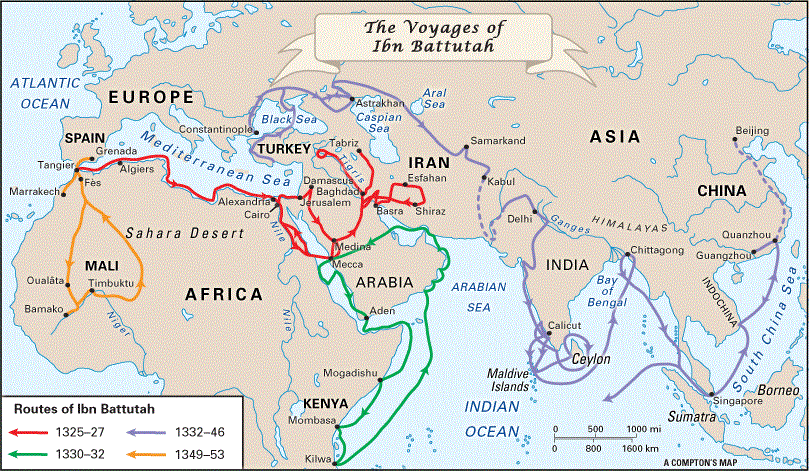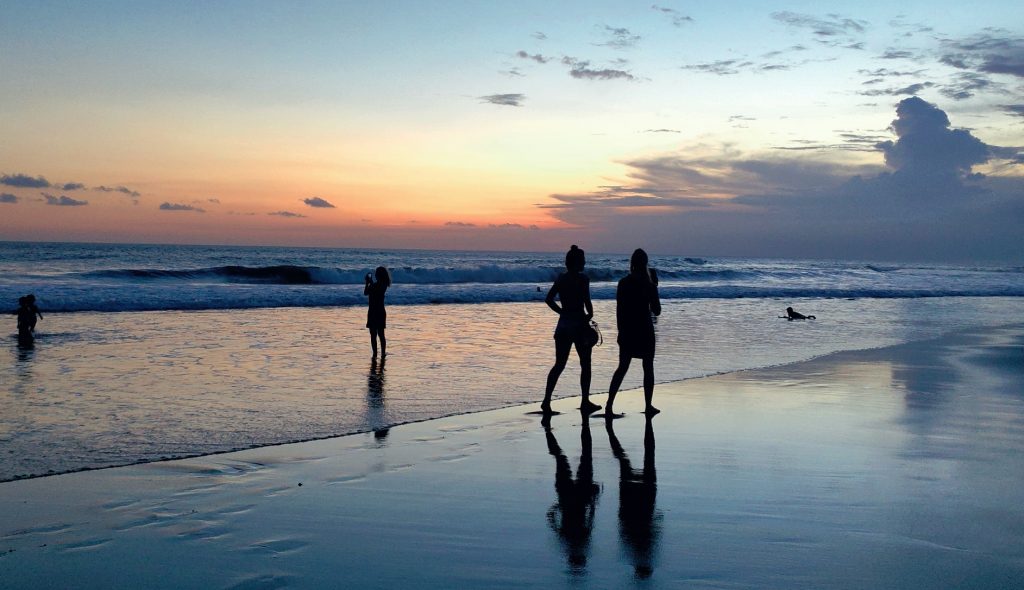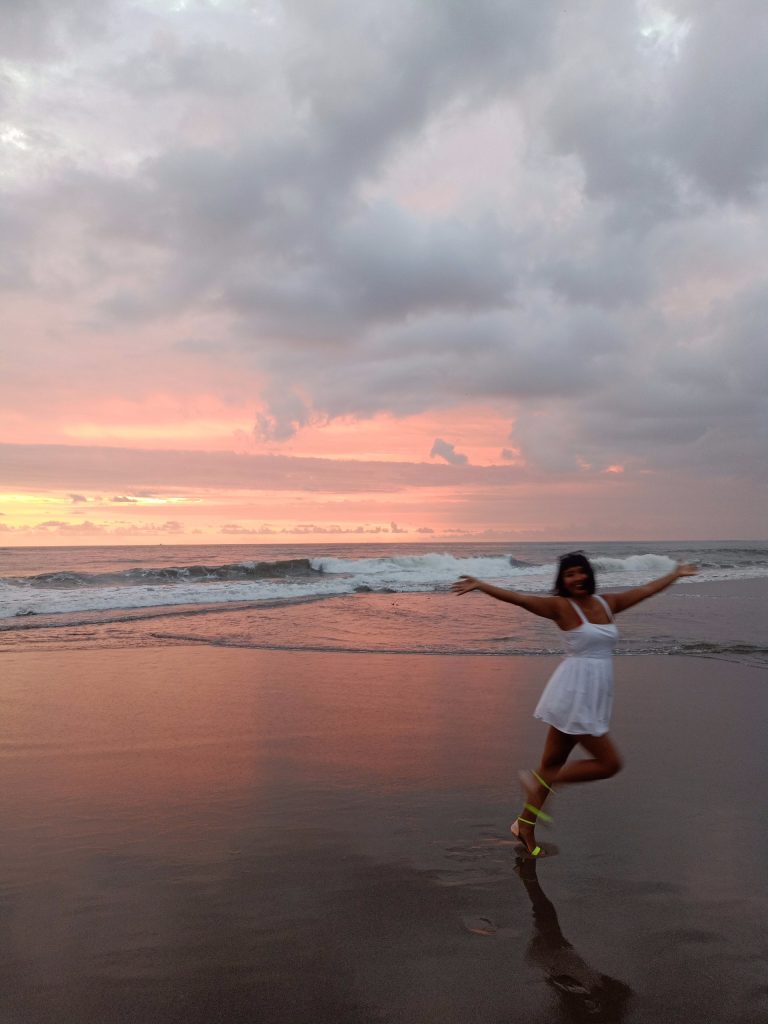“Say, [O Muhammad], ‘Travel through the land and observe how He began creation. Then Allah will produce the final creation…” Quran 29:20
I just finished watching Ibn Battuta documentary. He traveled for 29 years to 44 countries and experience so many different adventures along the way. From Egypt, Turkey, India, Maldives to China. He took time to visit the most prominent leaders of the city he visited, visited Mosques and find gurus, meditate and fasting in caves. He also do legal work as a Qadi (judge) for Sultans and was a very confident man. He knows how to deal with people, and he was only 21 when he started with one simple goal to perform Hajj in Mecca, which he eventually did after 1,5 years on the road and did at least 2 more Hajj during his lifetime.
The only easy thing when he traveled was because Islam rule most of those 44 countries he visited and he needs no Passport nor visa to enter the countries, no need to line up and answer private questions in public in order to get visas.
However, he had no planes either back in 1300s. He needs to ride horses, camels, donkeys, caravans and ships that can take months to get from one city to the other. My recent trip to US that took me 40+ hours seem pale compared to Ibn Battuta travel duration.
One thing for sure, traveling that long, takes lots of courage and character in you. He used to had a bad homesick especially when he was sick on the road, that he needs to be tied down on his horse so he won’t fall. But he keep going and won’t let any of that interrupt his will to travel.
He came back to his hometown Tangier, Morocco, after 29 years. The Sultan of Morocco insists that he wrote a travel journal. Ibn Jawzi was assigned to transcribed his story to writing. The book was simply called ‘Rihla’ or The Journey of Ibn Battuta. This book translated into English in 1829. The way Ibn Battuta told his story is as it is, based on his observations. I’m amazed how he can remember every details of the cities he visited and his overall experience from almost 30 years ago. What matters, stay, indeed.
I always want to do what he did. Travel around the world and work globally. So, this is what I’ve learned from him.
He prepared his skills.
He connects from Sultan to Sultan, approach the important and influential people and work for them.
He is emotionally intelligent. He knows how to touch people’s heart.
One of the example was when he was in debt in India and want Sultan to help him. Instead of directly asking the Sultan, he makes Sultan happy first, when he’s in a good mood, then he proceed with his request.
The reason of this debt was, the great expenses incurred in waiting on the Emperor, during his journies to repress the revolt of the Ain El Mulk. About this time, I composed a panegyric in praise of the Emperor, which I wrote in Arabic, and read to him. He translated it for himself, and was wonderfully pleased with it: for the Indians are fond of Arabic poetry, and are very desirous of (being memorialized in) it. I then informed him of the debt. I had incurred ; which he ordered to be discharged from his own treasury, and said: Take care, in future, not to exceed the extent of your income. May God reward him
He shows what he love, he built his personal branding well.
When he was working in India, the Sultan sent him as ambassador to China, just because he knows that not only Ibn Battuta capable, but he also love to travel.
He said, It is my wish to send you as ambassador to the Emperor of China, for I know you love travelling in various countries. I consented ; and he sent dresses of honour, horses, money, with every thing necessary for the journey
He’s patient through his trials.
He went through a lot trials and hardships during his travel, that includes being robbed, and his ship with lots of gifts and slaves for Chinese Emperor sank because of the storm. But he never gives up. He always find his way back on track and continue his journey.
The cavalry, about forty in number, rushed upon me and took me prisoner, before I was well aware of their being there. I was much afraid they would shoot me with their arrows. I alighted from my horse, therefore, and gave myself up as their prisoner. They then stripped me of all I had, bound me, and took me with them for two days, intending to kill me. Of their language I was quite ignorant : but God delivered me from them ; for they left me, and I took my course I knew not whither. I was much afraid they would take it into their heads to kill me ; I therefore hid myself in a forest thickly interwoven with trees and thorns, so much so, that a person wishing to hide himself could not be discovered. Whenever I ventured upon the roads, I found they always led, either to one of the villages of the infidels, or to some ruined village. I was always, therefore, under the necessity of returning ; and thus I passed seven whole days, during which I experienced the greatest horrors. My food was the fruit and leaves of the mountain trees.
At the end of the seventh day, however, I got sight of a black man, who had with him a owalking-staff shod with iron, and a small water vessel. He saluted me, and I returned the salute. He then said, What is your name? I answered, Mohammed. I then asked him his name: he replied, El Kalb El Karīh (i. e. the wounded heart). He then gave me some pulse, which he had with him, and some water to drink. He asked me whether I would accompany him. I did so ; but I soon found myself unable to move, and I sunk on the earth. He then carried me on his shoulders ; and as he walked on with me, I fell asleep. I awoke, however, about the time of dawn, and found myself at the Emperor’s palace-gate. A courier had already brought the news of what had happened, and of my loss, to the Emperor, who now asked me of all the particulars, and these I told him. He then gave me ten thousand dinars, and furnished me for my return.
He visited Indonesia!
He noticed Javanese hospitality that still embeded in our culture until now.
Whenever he visited a city, he became a part of it and not afraid to give suggestions and voice his concerns like when he was in Egypt.
He visited Mosques like Dome of Rock in Jerusalem and became like a Mosque reviewer.
This is one of the most marvelous of buildings, of the most perfect in architecture and strangest in shape… it has a plentiful share of loveliness… and rare beauty… The greater part of this decoration is surfaced with gold, so that it glows like a mass of light and flashes with the gleam of lightning… In the center of the Dome is the blessed Rock …for the Prophet (God bless him and give him peace) ascended from it to heaven. It is a solid piece of rock, projecting about a man’s height, and underneath it there is a cave… with steps leading down to it…
The journey of Ibn Battuta and the places he visited still remain to this day and has inspired many people to follow his tracks.
You can watch Ibn Battuta amazing documentary from these videos
Ramadan Kareem! I wrote 17 tips to have a productive Ramadan, please read and let me know what you think!




